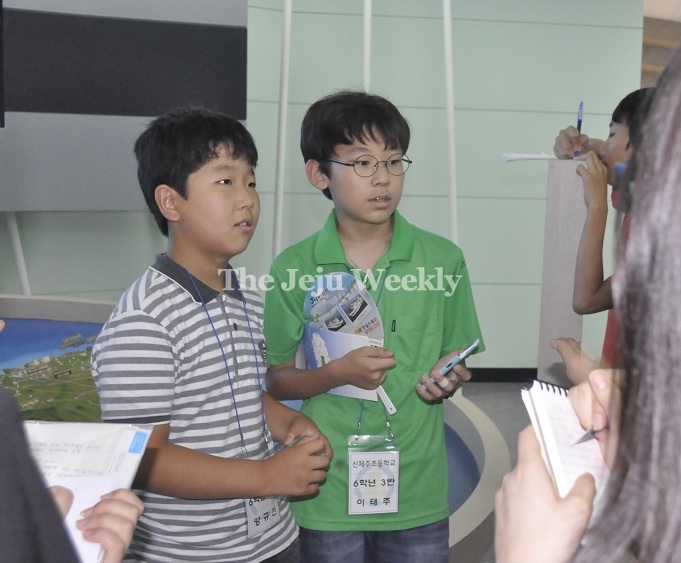|
| |
 |
|
| ▲ Shin Jeju Elementary School students are interviewed by JDC junior journalists. Photo by Kim Jinmi |
[This article is written by a JDC Junior Journalist. The JDC Junior Journalist program is an educational project sponsored by Jeju Free International City Development Corporation (JDC). JDC Junior Journalist articles are only briefly edited by mentors before publishing.]
After the Industrial Revolution, Korea produced many developments in various fields and joined the ranks of advanced countries. While this escalation was generally viewed as positive, people of the Korean peninsula were getting frustrated with the impact the development was having on their environment.
The depletion of the ozone layer has led to many people suffering from cataracts and skin cancer. Also, the low-lying districts of the area are flooding because of global warming. Tuvalu is a good example. It is the 'ecobomb' that humans of the 21st century are confronted by.
To find a solution, there are many small and large scale efforts underway worldwide.
"There are many alternatives, such as walking short distances rather than using transportation," member of the Shin-Jeju Elementary Green Club, Lee Tae-joon said.
Among these options, new and renewable energy struck the eye of the world as a way to preserve nature, because of its infinite replenishment capabilities.
What exactly is new and renewable energy? Despite its infinitude as an energy source, energy consumption is rapidly increasing. Because of this, humans face an energy crisis along with environmental issues.
The shift to new and renewable energy is from using fossil fuel to converting to renewable energy like sunlight, water, geothermal heat and biological organisms. Light of the sun, wind-power, Hydrogen energy are forms of them.
“We don't talk about the environment very much,” responded sixth grader Yang Gue-jin of Shin Jeju Elementary School. This concise and clear answer is not to be laughed off; it represents how that nowadays adolescents' awareness of environmental problem is "rather poor".
We are the future owner of nature on earth, which includes the Korea peninsula. Supposing we do not cultivate a natural environment, we could not settle the nature of a future generation. If we notice the seriousness of problems and fulfill our eco responsibilities, humans could dream of a better and unpolluted future.
|




















